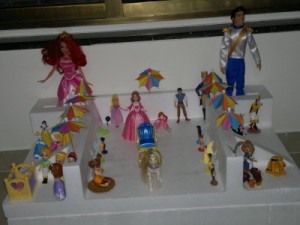“Do you want to raise an independent child?” Most of the parents will say yes! Everyone wants to see the independent child but no one wants to leave the control!!!
Yes you heard me right. You want your child to do her homework by herself, you want your child to get ready by herself, you want your child to eat and sleep by herself and truly speaking all these are just few characteristics of an independent child. The true independence comes with the confidence and confidence comes with the freedom, freedom to choose their clothes by themselves; freedom to choose their toys by themselves; freedom to choose their friends by themselves and freedom to choose their hobby by themselves.
What if your kid will wear her favorite dress in all the parties? Does it really matter? We say “Best attire in the world is smile” and when it comes to our kid we forget that. What is the meaning of an unhappy kid in the best dress? She may look beautiful but not satisfied and that’s what you are stealing from her, her confidence, her rights and most importantly her decision power.
10 steps to raise an independent child:
- Count on Age: Nothing can be achieved before time. If your kid is ready to attempt self-feed by the age of 1, she is independent. If your kid can choose her dress or toy by herself by the age of 2, she is independent. If your kid can change her clothes by herself at the age of 3, she is independent. If your kid can help you to set up the dinner table by the age of 4, she is independent. If your kid can ask her favorite dish for the dinner by the age of 5, she is independent. Before you expect think twice “is this the correct age?” We can’t cut the fruit before it ripens same way handling over the control before the age will not help you or her in anyways. Your kid will take over the control gradually and you should wait for that time. Rushing for the things will simply get you couple of failures which can snatch their self-confidence. Wait for the right age and embrace each attempt.
- Share the Responsibility: Being a parent we just want to leave our responsibilities for our comfort. We want them to do few things by themselves and we call that a step towards independence but the truth is we just want to reduce our responsibilities without sharing it. Kids are not master, they are learning so don’t run away from your responsibilities. For the start share the responsibility and slowly hand over the control. Initially guide them the way, explain in simple tasks and offer your help if needed. Make it fun by small challenges. For example, If you want to teach them to choose their toy ask “I count 5 and you come up with your favorite toy”. This may sounds silly to you but very effective technique to improve decision power.
- Don’t jump in to Help: Kids are slower than us so don’t lose your patience and jump into unnecessary help. They may need double time to finish the task so have patience and enjoy the beauty of their hard work.
- Respect their Decision: Don’t give your expert tips for everything. Let them take their own decision. It is okay if they choose to wear slipper instead of shoes; it is perfectly fine if their blue clips doesn’t go with their pink skirt, it is okay if their new toy arrangement don’t look amazing; important thing is they took the decision and they worked on that. Encourage every attempt by your words and gestures.
- Give choice when you need to Restrict: Respect every decision doesn’t mean you should give them junk food to eat just because they made a choice or let them go out in sun without sun scream. Justify your every NO in kids’ friendly way; offer 3 choices whenever possible and show your love even if they made a wrong decision.
- Encourage Attempts: Let your kids make mistakes (if not harmful) and learn from it. Let them learn what will happen if they don’t take water bottle with them. Instead of scolding support them in their failure and help them to take right decision in future. Failure loosens their self-confidence but your love lengthens the hope. So show your kids you are with them in all the right and wrong decisions to make them independent decision maker.
- Go with the Mood: Kids are moody, sometimes they get ready by themselves and sometimes they can’t take even a glass of water. This has nothing to do with their independence. I remember my mother feeding me Halawa(an Indian sweet) with her hand even when I was 20!!! And trust me that never stopped me to become an independent woman. Simply go with the flow and love the way they are.
- Welcome their Help: Kids are curious for the things they don’t know. If they offer their help, find at least one thing in your task and let them help you. This help may be very small and uncountable but it will add count on their confidence.
- Do not Force: Is it true that if we don’t force them to do the things now, they will always seek for our support? Does this mean we should not pamper them or we should hand over responsibilities at young age? Questions are many but answer is only one. NO. Never force your kids for anything as forcing them for the thing means giving support in one way or another. Secondly there is no meaning of forcing a kid to do anything before age. Third forcing them for the things they don’t know is totally ridiculous. For example, if they don’t know the answer of 2+2 no matter how hard you try, they won’t be able to answer. And forth forcing them too much can cause couple of failures which may steal their confidence.
- Accept the Nature: Few kids are ready to learn and few are slow; few are open to all and few are shy; few can take their decision even after many failures and few just give up on one mistake. Know your kid and accept the way she is. Show your love and support and help them to cope up with their limitations.




